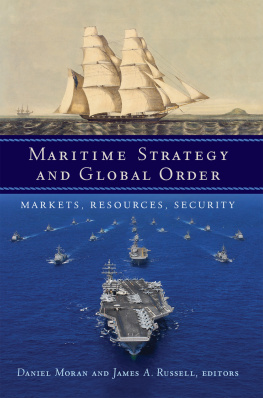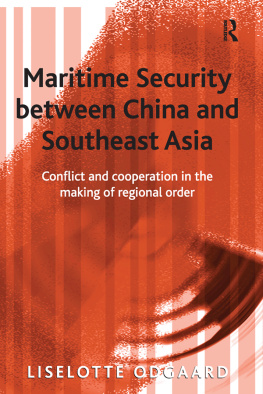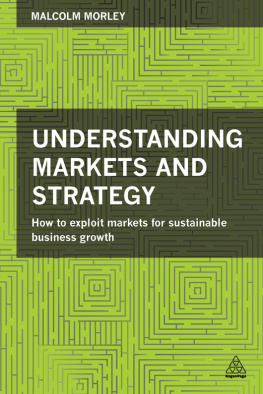2016 Georgetown University Press. All rights reserved. No part of this book may be reproduced or utilized in any form or by any means, electronic or mechanical, including photocopying and recording, or by any information storage and retrieval system, without permission in writing from the publisher.
Library of Congress Cataloging-in-Publication Data
Maritime strategy and global order : markets, resources, security / Daniel Moran and James A. Russell, editors.
pages cm
Includes bibliographical references and index.
ISBN 978-1-62616-300-3 (hardcover : alk. paper) ISBN 978-1-62616-072-9 (pbk. : alk. paper) ISBN 978-1-62616-301-0 (ebook)
1. Naval strategy. 2. Security, International. I. Moran, Daniel, editor. II. Russell, James A. (James Avery), 1958 editor.
V163.M37 2016
359'.03dc23
2015024227
This book is printed on acid-free paper meeting the requirements of the American National Standard for Permanence in Paper for Printed Library Materials.
17 16 9 8 7 6 5 4 3 2 First printing
Printed in the United States of America
Cover design by Trudi Gershenov Design. Top cover image National Maritime Museum, Greenwich, London; bottom cover image courtesy of US Navy/Mass Communication Specialist 3rd Class Dylan McCord.
Introduction
DANIEL MORAN AND JAMES A. RUSSELL
For the purposes of this volume strategy means a course of action, conducted by a political community in its relations with others, in which the use of force is not ruled out. This is not to say that violence is strategys only concern, nor its preferred instrument, merely that strategic interactions differ, in their psychological and moral characteristics, and sometimes in their logic, from dealings governed by the conventions of the marketplace, routine diplomatic practice, and so on. The ends of strategy are in principle those of policy, to which the use of forcible means, real or implied, may nevertheless add imponderable and even confounding features. To have politics at all, one must be willing to compromise, and to fight. Strategy is concerned with where and how this line is drawn, and the manner in which it is crossed. It is in the reconciliation of ends and means that strategy poses its most severe challenges, and achieves its most distinctive results.
Our theme is the exercise of strategy on and from the sea. Maritime strategy, to borrow a phrase from Clausewitz (who paid it little mind), has long been recognized as having a dual nature. Traditionally, as Nicholas Tracy has said, the term has been used to describe the employment of naval forces to achieve political ends by their impact on international trade. Trade is, in itself, a crucial source of political power, and of explicit or implicit strategic leverage, as the contents of this volume demonstrate. Yet it strains belief, or at any rate muddies the water, to conceive of trade as a weapon. The distinctive weapons of maritime strategy are navies, whose application is shaped by the fact that human beings do not live on the sea but on land. As a consequence, as Julian Corbett observed, great issues between nations at war have always been decidedexcept in the rarest caseseither by what your army can do against your enemys territory and national life, or else by the fear of what the fleet makes it possible for your army to do. Navies on their own have limited value for controlling people and territory. Their strategic leverage lies in their capacity to secure or deny access to resources, to markets, to enemies, to allies, to battlefields, and to information.
In addressing these matters, our focus is less on the actions of navies in war than on their role in creating and sustaining global order, as reflected in the abundant, reliable, and generally nonviolent movement of goods, money, and people on the sea. When sailing navies mastered the oceans, they made the world a much bigger place for its human inhabitants, literally and figuratively; but they also made it a smaller one, lending impetus to a new and compelling idea: that the human prospect could be improved by increasing interaction among humanitys diverse communities, from which any and all might benefit. As Steven Haines observes in his chapter on international law, the great Dutch jurist Hugo Grotius first conceived of the sea as a natural zone of freedom because its ubiquity could only be understood as a providential sign that the many parts of the human family should come to know one another. Such an idea would not have been thinkable if the sea had not been transformed from a nearly impassable barrier into what Mahan would famously call a great highway.
That the exercise of freedom is dependent on the establishment of order is as true at sea as on land, and explains why global order is a strategic achievement rather than a natural phenomenon. Order can take, and has taken, diverse forms; but none of them are value free. There are always those who think they can profit from disorder, or that the workings of global markets or the system of nation-states are configured to do them harm. Such impressions are not necessarily misplaced. It is scarcely credible to argue that order, however constituted, is equivalent to equity. Yet the consequences of global disorder for peace and prosperity remain, on balance, so foreseeably appalling that its avoidance can fairly be judged the preeminent goal of modern politics.
The preservation of peace at sea, and of free access to it, provides crucial ballast for the stability of the international system. This volume aims to shed light on how this is accomplished. Throughout, the emphasis falls on the longer and slower rhythms whereby the military, political, and economic uses of the sea contribute to the maintenance of peace, the integration of the world economy, and, when necessary, the conduct of war. We have thus sought to place the development, maintenance, and use of naval forces within the broader political and economic contexts that give them meaning.
Our goal in this volume is to draw attention to the exercise of maritime power in its diverse forms, and over the long run. The governing idea throughout is that the significance of maritime strategy becomes more clearly visible when viewed across significant stretches of time and space, and when the integration of military and nonmilitary elements is given full weight. In peace, as in war, the passage of time accrues to the benefit of those who have the means to employ the forms of strategic leverage that mastery of the sea affords. This process is easily obscured by the episodic drama and intense violence of naval combat. Periods of violent conflict at sea do not serve well as the baseline from which the general working of maritime strategy can be judged. We have tried to do these periods justice in the chapters that follow, and do not mean to diminish their consequence. Yet they are the exception rather than the rule at all times, and most certainly so recently, as the last great era of naval warfare fades from living memory.









